Singapore Chefs’ Association Gala Dinner 2017
by Darinee Durai
@ 08 Dec 2017
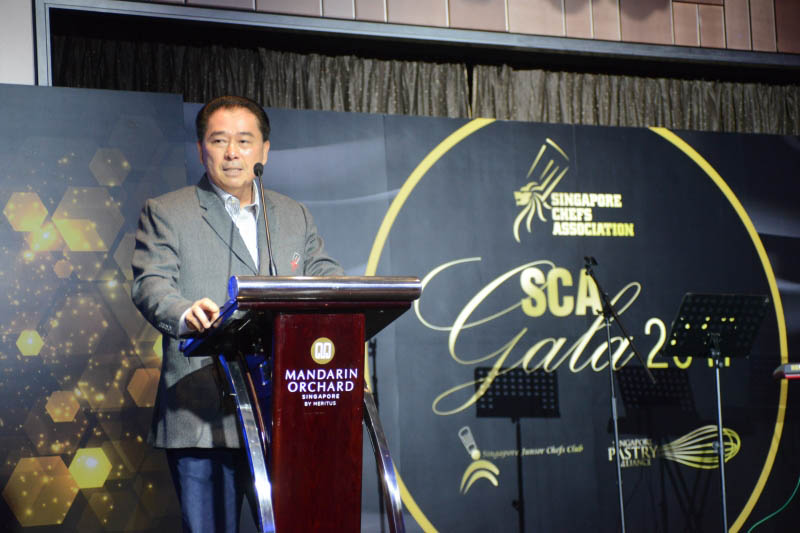
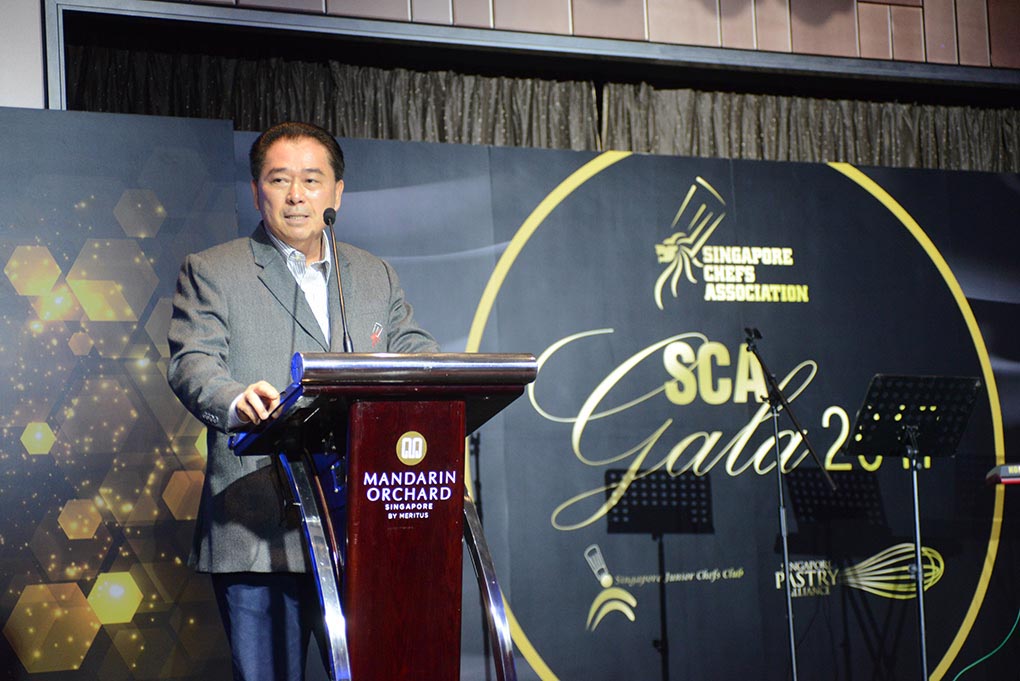
In 2016, Singapore became the overall champions at the prestigious IKA Culinary Olympics. Hailed as one of the top culinary competitions globally, clinching this title is no small feat for the National Singapore Culinary Team and their mentors that have worked endlessly to make it happen. The title eluded the nation for almost 32 years, but they finally got it.1982 was the year German-born Chef Peter A. Knipp, after drawing on his years of Asian cuisine cooked a local delicacy – the black chicken and served it up to a panel of purely white judges. That calculated move flung Singapore unto the world spotlight.
This year, new committee members have taken up their roles including Chef Louis Tay who will be leading and guiding future culinary competitions. Chef Randy Chow, previously the competition head of SCA once shared with us how they decide which chefs to send out for competitions, “ It all starts from the regional competitions hosted by any local suppliers. These watchful committee members will attend these events, each of whom have sharp, keen eyes will watch the competitions and the competitors. Basically, when we see someone, we will approach them and ask them if they’re keen to join SCA and that we will groom them for future competitions. If they show good potential and good character during the interview, we will bring them in. We can’t keep featuring the same old faces. If anyone has the right talent with the right attitude – our doors are always open. Flair is necessary in cooking and fluidity in movement is something we look out for. Some people don’t have that intrinsically, but when they push hard, they become better than those who do because they’re so passionate.”
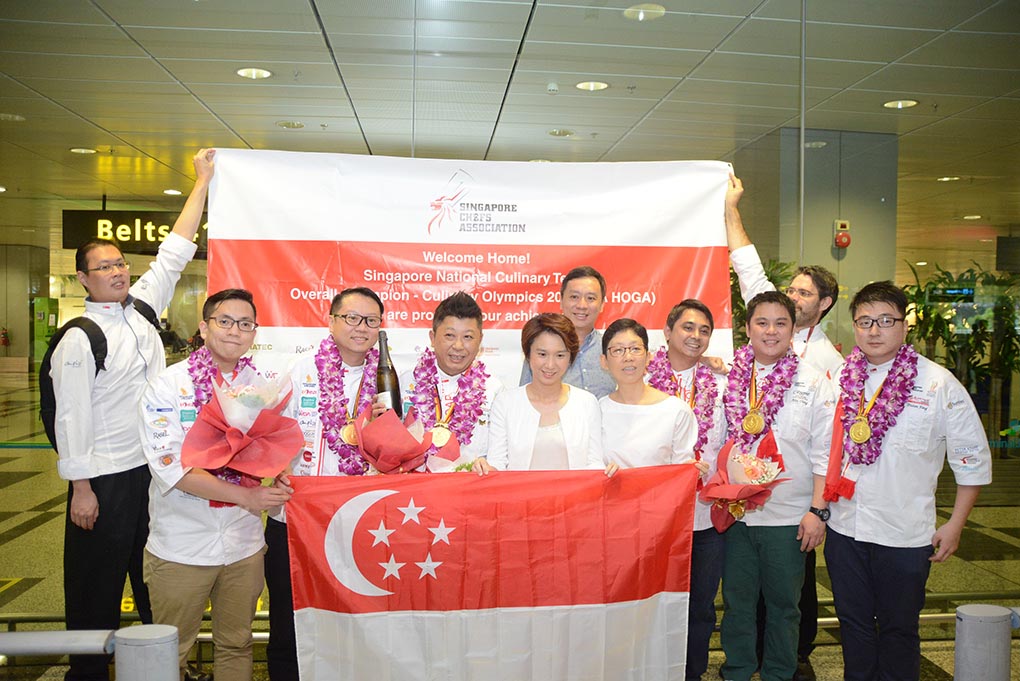
Image: The winning team returns to Singapore!
The core members of the Singapore National Culinary Team 2016 have done what others before them have failed marginally to do since 1984 – they became the overall champions of the IKA Culinary Olympics. Training by oneself is already challenging, but training as a team is more challenging logistically and time-wise. Each of the core members have their own full-time jobs and families to account for. “For us, when we go for a competition, it’s not so much about competing against others. It’s about competing against ourselves. Because we know what kind of level we’re at, what sort of boundaries we need to push to get out of our comfort zone. We want to come up with something that we don’t normally do,” Chef Teo Yeow Siang, the team captain says. He’s the driving force behind the team. Team manager, Chef Louis Tay trusts him completely, “He understands the team. He knows their strengths and weaknesses. Whenever the mentors comment on our dishes, we will discuss it. If the mentors want to change something, we will talk about it. At the end of the day, the decision is still up to the team. If you decided that you want to take part in the competition, you don’t give up.” Chef Teo elaborates with enthusiasm, “Chef Ivan and Chef Randy have been the main guiding lights for us during the training and whenever we had problems. We keep challenging ourselves to keep improving the recipes. We have to agree.” During the training sessions, we can only imagine how hard it was for the team to receive criticism, but Chef Teo says, “We are all seasoned competitors, we know when we put up our food, we know it’s open to critique. Nothing is taken personally. We need the criticism to improve. It’s all professional comments. We all know how the game is played.” Chef Roy Lim mentions in regard to how hard is, “Nope, we never thought of giving up. Before competing we already have a mindset that was drilled into our head. We are going all the way and we will make it happen. If in the end, we do not compete and leave in the team, imagine the inconvenience we would have had caused the whole team if you gave up half way.”Chef Tristan Fang shares, “I started out as assistant first and join different class of competition before in the team. Advice and guidance from the mentors and the bonding within the team give the most encouragement. Recognition is definitely a moving factor and I feel the support of the media is the answer.
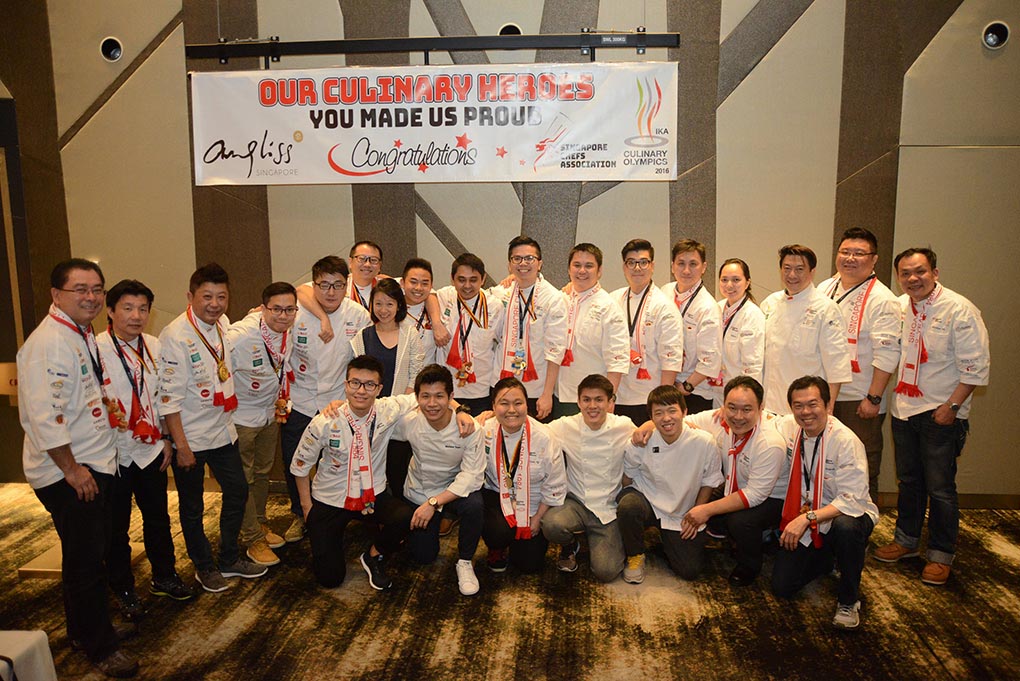
Image: The team, their mentors and assistants
Chef Alex Chong, the pastry chef of the group and his assistants received the highest marks allocated to the pastry section of the competition. He tells us about what sacrifices he made during the training, “Rest days and family time. I can only do my trainings on my off days which in returns there is no rest days. And I have less time to spend with my family as I have to put all my focus on trainings to prepare for the competition. Chef Alan Wong had to go through the same thing, “I was not able to neither spend time with my family nor help my wife with taking care of our newborn and 4 year old daughter; the fact that we do not have a helper and she was a one man show running the household. Sleeping hours were very short and we had to work 2 weeks straight without any off day. It was tiring.”
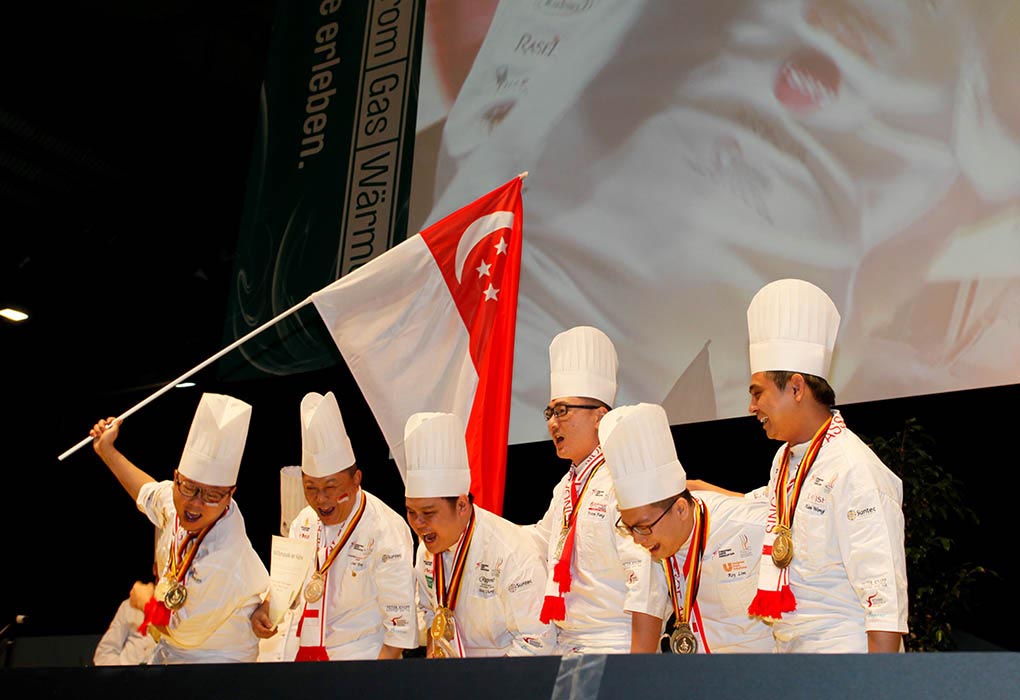
Image: The team announced as winners!
Now, the Singapore Chefs Association has grown much since it was first established in 1984. They’ve secured many titles at international culinary platforms over the years, passed major milestones and their success goes without saying to the support behind them. Most of these chefs are veteran competitors – having made some mistakes and winning awards along the way. Their battle is over so to speak. The assistants may not actively be there all the time, but they do help to enrich a dish or give suggestions where possible. So why commit more of their time which could be used for a multitude of things to train a team? Chef Eric Teo says, “I was once a young competitor and needed help .Without a mentor then, I wouldn't be where I am now and have achieved so much. It’s time for me to return to the community and guide a less experienced cook by building trust and injecting positive behaviour into them. A true mentor does not need recognition but satisfaction.” These mentors themselves have faced tough times during their journey and the support they got was crucial. “Family and work support will be the most critical for me. After a long day of work and training you go home and you know everything is well taken care off, it’s really a blessing to have an understanding and supportive wife/partner. As for work support, that would mean a supportive company/boss and kitchen team. Sometimes you will need to juggle between daily operation, meetings and training all in one day,” Chef Eric Chua shares. Chef Otto Weibel, one of the most respected and valued mentor-chefs to date enlightens us, “First and foremost, to participate in any competition is to select the right team members. Chefs of the team must be willing to work hard and spend a lot of time in training. They also need the support of their companies where they worked for. The attitude of each member is crucial in making a great team. They must be proud to represent Singapore and to compete against other national teams. It has to be a dream come true for them to be part of the team. With that, they would naturally be 100% committed – possess the determination to strive, the ability to handle stress and perform under pressure and to be a great team player. What it takes to train a talented team; is to understand the basic criteria of the competition. Once we form the team, we have to find out each member’s strengths and weaknesses. We then divide the job accordingly to their key strengths. It will also take many hours of training, feedback sessions and follow up meetings on improvements. To achieve all these, I have to make sure that the team is highly motivated as there will be constant changes, which may lead to some unhappiness. Therefore, we always need to make sure the team is happy and maintain their best. Last but definitely not least, celebrate success together.”
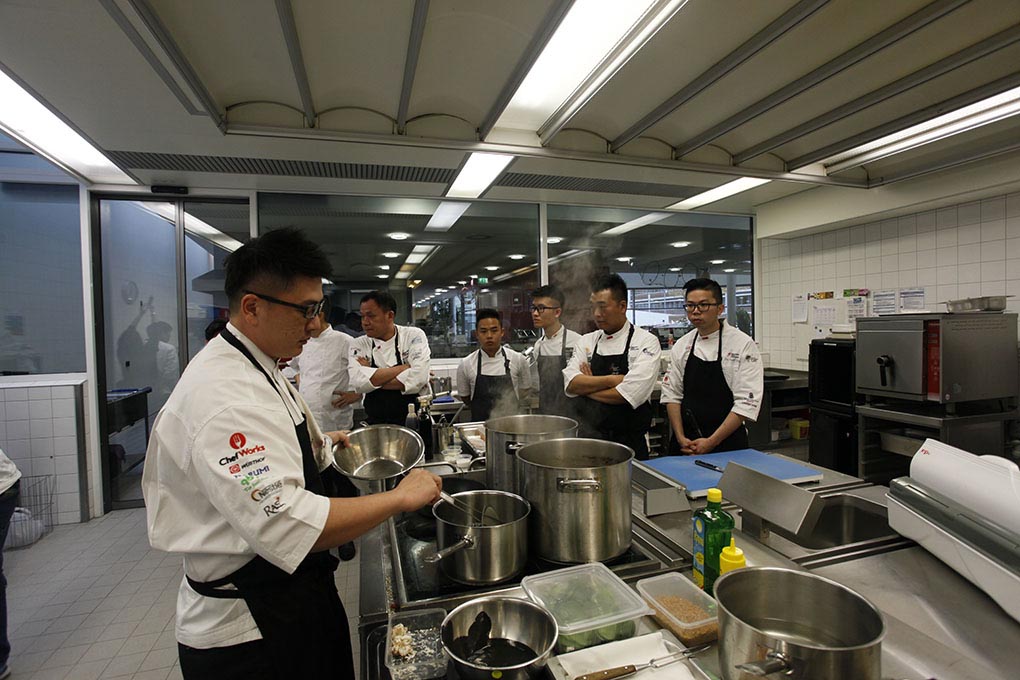
Image: Training sessions before the competition
What about training methods? Is there a secret recipe to success? Chef Khoo Wee Bin, known for being one of the toughest and harshest mentors around tells us his take, “Take for example the bi-annual Food and Hotel Asia (FHA) competition. For each category, we’re talking about at least 100 participants and you don’t just see local people. There’s a mix of international and local competitors and judges. We’re up against high expectations and sometimes even political factors that in my opinion might hinder us from winning. I tell myself that regardless of all of these, competitions are a platform for me to educate. I am harsh, but there’s a reason for it. I stimulated the students that I trained – I placed them under a certain amount of stress intentionally. My aim is to emulate the competition environment for them. I need them to think of all the worst case scenarios and go through them where possible so that they come up with solutions.”
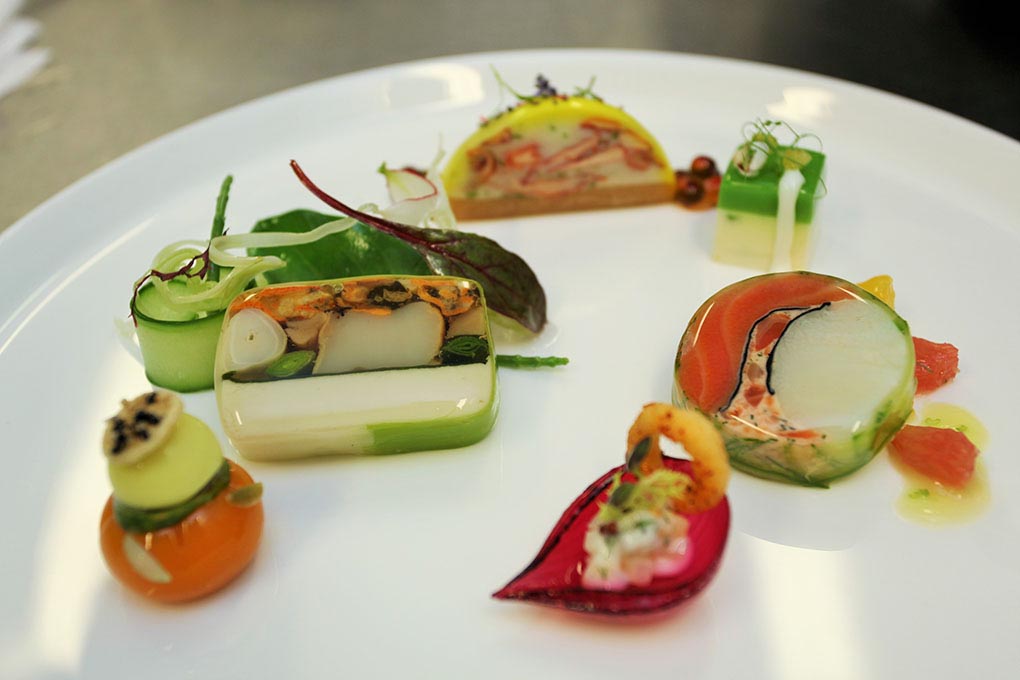
Image: Aspic covered dishes for cold displays
Should the mentors change their ways? Having the Singapore National Culinary team clinched the title of National Culinary Olympic Champions, Chef Anderson Ho feels, “The SCA mentors must be doing something right that resulted in recent spate of successful results in most of the international culinary competitions and I think we should continue what we are doing. Having said that, we have plenty of rooms to improve since all mentors should also be kept abreast with what is the culinary trends and new techniques that we “old dogs” could still learn - new skills and techniques that we may not be so familiar with. This will be challenging since it involves funding which SCA already is struggling with to continue sending our teams for overseas’ competitions. Another thing I would like to see is that the current training/coaching methods and procedures should be properly documented as a reference and legacy for future mentors – unfortunately this is yet to be in place since most chefs lack this skill set. Chefs will be chefs!”
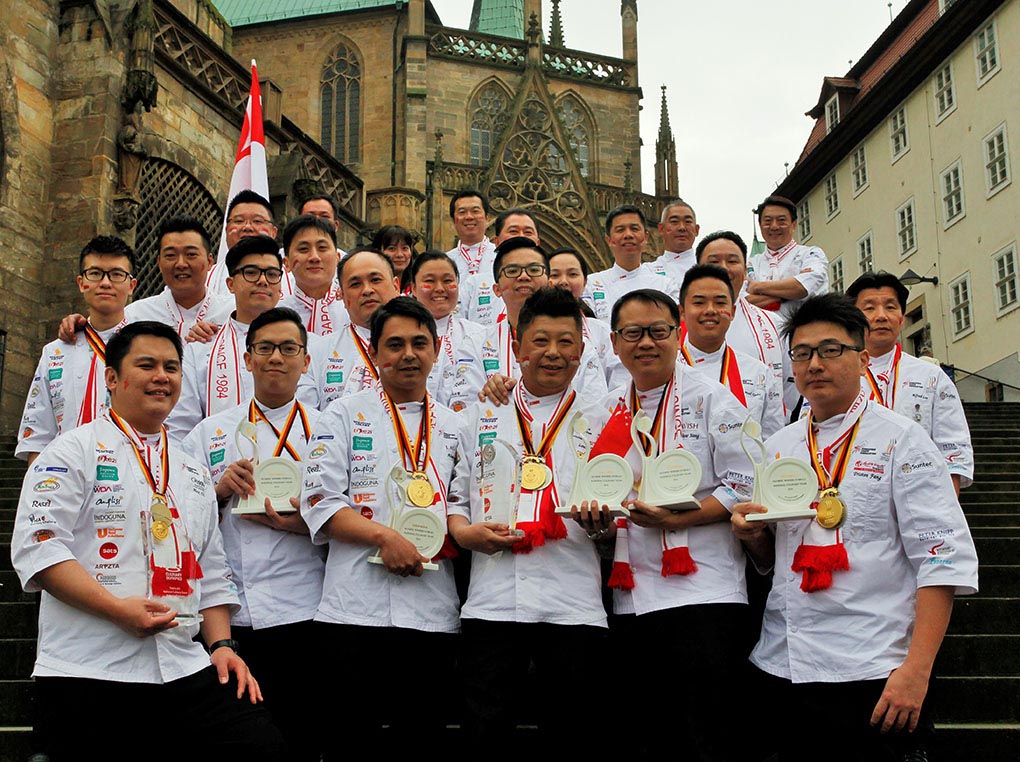
Chef Ivan Yeo agrees, “One should have great experience in the culinary industry to keep abreast on what is available in the market and also to understand the nature and specific natural flavour of each individual ingredient and how to combine them to create a winning dish. I am always flexible, able to adapt, and accept new techniques but most importantly I would like listen to the team first and understand how they had arrived at their creations. From there, I am able to improve the dish if necessary.”
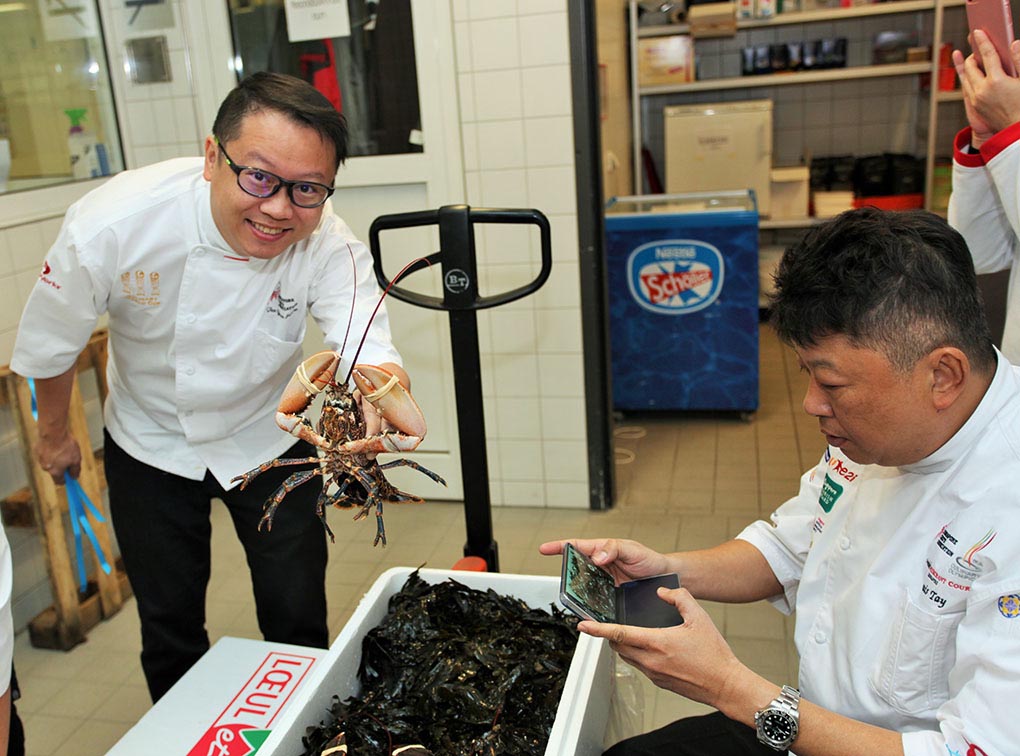
Image: Chef Yeow Siang and Chef Louis Tay with the lobsters
Chef Jasmine Ng, the Golden Girl who achieved an immaculate score of 40/40 during ‘The Taste of Canada’ competition in the year 1989 mentions the difficulties faced when trying to train a team, “Handling chefs can be more difficult that students or cooks. Getting everyone to change their habits when performing certain tasks was pretty tough as these chefs were set in their own ways of doing things. We had no training facility and full-time jobs to deal with, so setting a time to train and meet was a constant hassle. We did everything ourselves – from training to the packing of equipment and looking of sponsors right down to communicating with outsiders where necessary as most of these chefs weren’t fluent in English.”
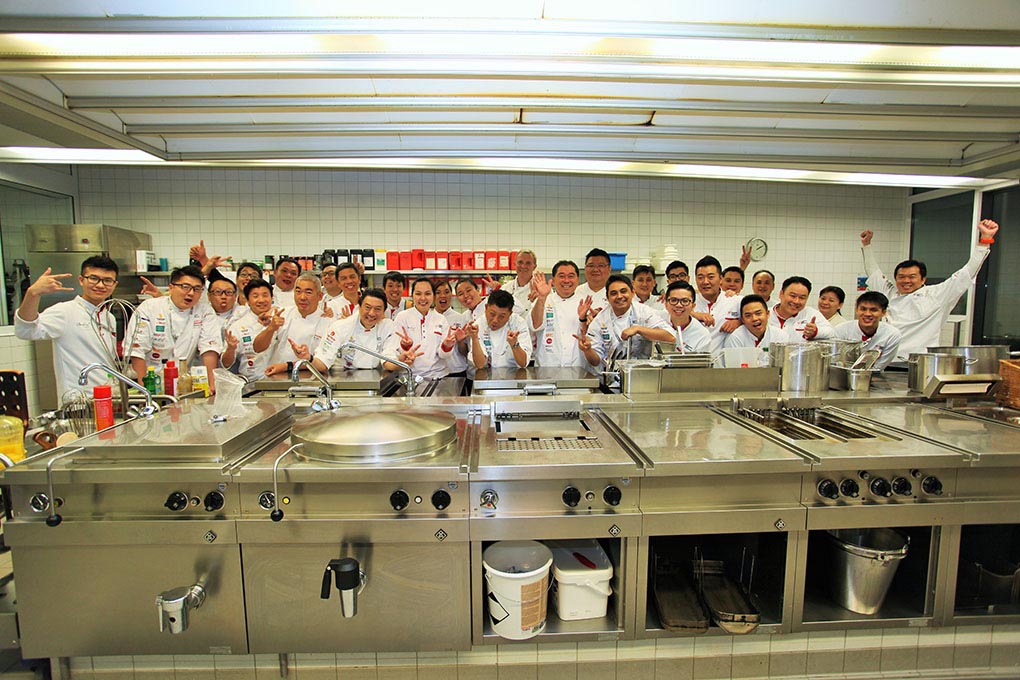
Image: The core team, mentors and assistants in their practice kitchen before the competition
Funding is one of the most crucial factors that ensure the team is well prepared for any competition. SCA is supported by generous sponsors who see the value in the national team. But besides that, being a non-profit organization, SCA holds its own fundraisers and such to be able to financially support their training. Chef Leons Tan acknowledges the difficulty that the SCA faces, “Getting funding is one of the many challenges you have to embark on even before you are physically in the competition arena. We have to think of all sorts of creative ways to solicit funding and we are blessed that there are quite few very supportive entities out there. But there are some mega companies that would demand outright returns first and they will list down their conditions before they commit to anything. This list normally puts extra strain on the competing team members, and they will have to put extra time to fulfil this demands. Well, I guess it is their way of “supporting” the cause, but then there are entities that just believe strongly in what you are doing and willingly fund the cause without a single request. Chef Yong Ming Choong, one of the most talented pastry chefs that Singapore has sent to compete echoes Chef Tan’s opinions, “I think practical support would be the best recognition. Funding is one way. The teams that are heading out will need quality equipment and ingredients to work with. By easing their minds off funding, then they can focus on winning. In my opinion, this will be a good form of recognition. ? “Sports stars are paid to train – chef pay to train that is a big difference, also a sports star may dedicate all their time to training as it is their job, chefs compete for the love of it and for the respect of our industry. We do not get paid to represent our country or promote our country, this comes from the heart! This is the main point that governments should take into consideration when allocating budgets and fundings,” says Chef Rick Stephen, the Continental Director of Asia. Chef Tony Khoo speaks up about this as well, “Many a times, we have to galvanised funds raising effort, there were entities whom wants outright returns for the funds that they contribute, very business-like, even though we are doing in part for the flag. Only when we fulfil to their expectations “KPI” that they will fund us.”
Chef Eric Ong talks to us about the support he has received, “It is definitely the support and encouragement given by my lovely wife and kids and the Grand Park City Hall team. We are all in this together and I realised that it is not just about me. There are people who are concern about me and wish upon my success. Therefore this motivates me further and I do not want to disappoint myself, let alone disappoint them.
Chef Justin Quek shares with us what role he has to play in Singapore’s culinary competition scene,” While I do not personally coach young chefs for competitions, as the VP for Bocuse d'Or Singapore, I also help to motivate and guide the competing chefs. Our time and effort as committee members is also put on getting more resources for our competing chefs. You might ask how that is important. Let's take Norway for example: a competition chef can dedicate his entire year to perfecting the competition dishes through working with ex-competition winners and other top chefs. This is made possible because they have sponsors that allow the chefs to go on paid leave for a year so that he doesn't have to stress about juggling work and training. Helping to build a holistic support system for the competition chefs is as important in coaching them, and that is why I put in my time. I like to look at the big picture - and look beyond just guiding competition chefs, because while winning at competitions helps to build our country's reputation, we also need to work on building up the calibre of Singapore's chefs. That is the foundation for a nation of good chefs. For a couple of years I have been a mentor at SHATEC, helping the students find their path. The options for young cooks are so plenty and sometimes they can get lost; it doesn't help that a lot of establishments don't provide a very strong training system to help them excel. In some places, it is the trainees who train the new chefs! So I come in to share my experience, and in some cases, offer them the opportunity to hone different kitchen skills so that they can discover their talent and potential.”
With regards to the funding, the SCA has come up with a book – Firestarter. Aptly named, the book speaks about each chef’s passion; requiring the efforts of the chefs and their establishments alike. The book cannot be purchased and can only be given as a token of appreciation if a generous soul donates SGD$88 and above. President Edmund Toh said, “As the book is not for sale, we are not able to sell it. However, we are raising funds for the Singapore National Culinary Team to the World Cup in Luxembourg and also for the Singapore Junior Culinary Team. For donations of SGD$88 and above, we will be happy to offer a commemorative book as our thank you gesture. It has been the mission of the Singapore Chefs’ Association to promote and elevate the culinary industry, and your donation will help us greatly in working towards this cause.”
Do contact: Chef Elvin Chew at
elvin.chew@30bencoolen.com.sg and support the team by donating to the cause









